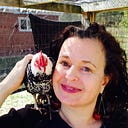10 Questions: Vegan Rockstar with Marc Pierschel of “The End of Meat.”
It seems like every few months, there’s a new documentary out that is damning of the meat industry but sometimes there is a new one that is a cut above the formulaic insert-tab-A-into-slot-B approach so many seem to be taking these days. I’d say The End of Meat by filmmaker Marc Pierschel, available on Amazon Prime and many streaming and video-on-demand platforms, qualifies. I highly recommend it. While The End of Meat takes the same approach as many of the recent docs of interviewing a variety of people, it is different in its scope, taking us from Europe, to North America, to India while pursuing the core question: What would the end of meat look like? How would it take shape? I loved the emphasis on conceptualizing a future without animal agribusiness with conversations with everyone from philosophers to physicians, business people to animal rescuers. In all, audiences are presented a much less grim picture than many movies covering this topic, though certainly our present reality and potential bleak future is not overlooked and viewers should expect some graphic, but not gratuitous, footage. (Less than two minutes of undercover footage, actually.) On the balance, though, the film is focused on those who are creating compassionate change in the world and giving us hope for a sustainable future. Check out the film’s Instagram and Facebook for more information. I’m glad to feature the director Marc Pierschel as this week’s Vegan Rockstar.
1. First of all, we’d love to hear your “vegan evolution” story. How did you start out? Did you have any early influences or experiences as a young person that in retrospect helped to pave your path?
I was a vegetarian for four years when I watched a documentary film called Baraka by director Ron Fricke. It is a film unlike any other, and there was a scene showing baby chicks being “sexed” — the process of determining whether the chick is a hen or a rooster. I had no idea this was going on and, since it was before the internet, it was a little difficult to find more information on the dark side of eggs and dairy. But after I learned more about the animal products I was still consuming, I decided to go vegan. That was 18 years ago.
2. Imagine that you are pre-vegan again: how could someone have talked to you and what could they have said or shown you that could have been the most effective way to have a positive influence on you moving toward veganism?
Probably by making me a really good vegan pizza, because I just couldn’t believe that delicious pizza without cow’s cheese was even possible at that point in time. And I still think that good vegan food is one of the best arguments for veganism.
3. What have you found to be the most effective way to communicate your message as a vegan? For example, humor, passion, images, etc.?
I feel like it is always different and depends on what speaks to the individual. For me it was the ethical argument. But I also learned that holding the “moral high ground” almost never works, and leading by example is way more effective.
4. What do you think are the biggest strengths of the vegan movement?
I think right now it’s the millennials who are really helping to push the movement forward with new forms of activism, like the Save Movement and Anonymous for the Voiceless. Combined with the ability to share via social media what is going on in factory farms and slaughterhouses, and the ever-increasing range of readily available vegan foods, this generation will really be able to make a huge impact for the animals.
5. What do you think are our biggest hindrances to getting the word out effectively?
I don’t have all the facts to answer that question, plus I think “effectiveness” is very difficult to measure. But I think that as vegans we should be more supportive of people on their path to cutting out animal products. Most of us didn’t go vegan overnight; we should encourage more instead of criticizing.
6. All of us need a “why vegan” elevator pitch. We’d love to hear yours.
“Try this vegan pizza — it’s that good!”
7. Who are the people and what are the books, films, websites and organizations that have had the greatest influence on your veganism and your continuing evolution?
Baraka and Samsara — two amazing documentary films by Ron Fricke.
8. Burn-out is so common among vegans: what do you do to unwind, recharge and inspire yourself?
I cycle a lot, love cooking and try to read a book every now and then.
9. What is the issue nearest and dearest to your heart that you would like others to know more about?
To everyone who wants to get a glimpse of what The End of Meat looks like in actual practice, visit your nearest farmed animal sanctuary. Hanging out with cows, pigs, chickens, goats, sheep and other rescued farmed animals is a wonderful experience. Support the sanctuary by offering to volunteer or sponsor an animal. These places are great for educating others about the individuals behind the meat, dairy and eggs they consume.
10. Please finish this sentence: “To me, being vegan is…”
…the next inevitable step in our evolution.
